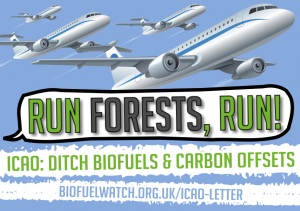 International Civil Aviation Organisation (ICAO) Council must ditch biofuel plans and abandon the myth of ‘carbon neutral’ growth
International Civil Aviation Organisation (ICAO) Council must ditch biofuel plans and abandon the myth of ‘carbon neutral’ growth
Please click here for a pdf with the full list of 96 signatories
From 11th to 29th June 2018, the International Civil Aviation Organisation (ICAO) Council will be meeting in Montreal. High up on the agenda are proposed rules for a Carbon Offsetting and Reduction Scheme for International Aviation (CORSIA). CORSIA is based on the false assumption that carbon emissions from the fast-growing aviation industry can be mitigated through carbon offsetting and biofuels.
During the High-Level ICAO Conference on “Sustainable Alternative Aviation Fuels” in October 2017, member states rejected proposed biofuel targets for aviation. At that time, 96 civil society groups had warned that such targets would lead to significantly further expansion of monoculture plantations – most likely oil palm plantations, and thus to more land-grabbing and food price volatility, more deforestation, more biodiversity destruction, more agrochemical use, and pollution of freshwater, without reducing the climate impacts of aviation 1.
Yet even without explicit targets, proposed CORSIA rules could open the door to large-scale use of biofuels in planes.
Proposed CORSIA rules would allow airlines to use any biofuels to try and meet ‘carbon neutral growth’ commitments from 2020, as long as they meet two extremely weak criteria, with no credible mechanism for enforcing even those 2. ICAO’s environment body had previously proposed 17 environmental and social criteria, which might at least have made it much more difficult for airlines to use palm oil. However, as a recent report by Changing Markets illustrates3, there are serious inherent problems with relying on sustainability certification. In relation to palm oil, the report concludes, “none of the schemes has been effective at slowing down deforestation, peatland draining or the loss of biodiversity”.
The only type of biofuels suitable for aircraft that can be reliably produced at scale is based on Hydrotreated Vegetable Oil (HVO), and palm oil (including a fraction of palm oil falsely described as a residue or waste)4, is the favourite feedstock for HVO production because it is the cheapest vegetable oil on the world markets and the cheapest to refine5.
ICAO’s biofuel plans therefore threaten to turn the aviation industry into a new driver of deforestation6 – as well as land-grabbing and land and human rights abuses. At the same time, they do nothing to address the ever-growing greenhouse gas emissions from aviation, linked to the industry’s unending growth.
It is even more worrying that – besides biofuels – ICAO’s CORSIA will allow airlines to achieve so-called “neutrality” through the use of carbon offsets. ICAO’s carbon offset plans were denounced by 80 civil society organisations in 20167. In January 2018, Virgin Atlantic pulled out of a forest carbon offset project in Cambodia after high levels of deforestation as well as serious human rights abuses were revealed in the project area – meaning the aviation emissions were not being offset at all8. Unfortunately, this is far from an isolated incident, and airlines can expect more and more of these cases to be exposed as the industry’s use of offsets expands.
The future of offsetting is even further in doubt because achieving the goal of the Paris Agreement requires all states and all sectors to cut their emissions to zero. There is therefore no role for a mechanism where one sector avoids emission cuts by paying other sectors to cut theirs.
Finally, there are even proposals to allow fossil-fuels to be classified as ‘sustainable aviation fuels’ and to be credited under CORSIA. This could mean kerosene from oil refineries where heat and power come from burning wood, which is falsely classified as carbon neutral (which would put yet more pressures on forests) – or kerosene sourced from oil wells that require less energy to drill than others, would be classed as sustainable.
We urge the members of the ICAO Council to reject CORSIA mechanism, which is based on the false solutions of biofuels and offsetting plan – and which may even reward fossil fuel companies directly – and to take the aim of the Paris Climate Agreement to limit global warming to 1.50C seriously, which cannot be achieved unless aviation growth is ended and reversed.
- biofuelwatch.org.uk/2017/aviation-biofuels-open-letter/
- The only proposed criteria are that feedstock should not come from land deforested after 2009 and that biofuels should have 10% greenhouse gas emissions compared to conventional jet fuels – based on a flawed methodology under which many of the climate impacts of biofuels are ignored. See transportenvironment.org/press/eu-commission-surrenders-united-nations%E2%80%99-icao-aviation-biofuels
- changingmarkets.org/wp-content/uploads/2018/05/False-promise_full-report-ENG.pdf
- Palm Fatty Acid Distillate(PFAD) is widely used by Neste and also by other HVO producers, who describe it as a ‘residue or waste’. This is not a genuine residue but a fraction of Crude Palm Oil which is in high demand for other uses. At present, PFAD accounts of 4-5% of Crude Palm Oil, but the proportion could rise if demand and prices for PFAD go up further.
- Palm oil is high in saturated fats, which makes it cheaper to refine to HVO than vegetable oils such as rapeseed oil that are low in such fats.
- d5i6is0eze552.cloudfront.net/documents/Publikasjoner/Andre-rapporter/Cerulogy_Driving-deforestation_Jan2018.pdf?mtime=20180122234132
- fern.org/icaodeclaration
- fern.org/node/554
